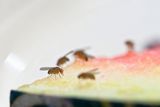Science
Fruit Flies Reveal How Nutrient Needs Drive Sensory Cravings

Research from the Champalimaud Centre has uncovered how physiological needs can transform into sensory cravings, revealing insights into the mechanisms of hunger. The study focused on fruit flies, demonstrating that a deficiency in essential amino acids can reshape their brains, prompting them to seek out microbial partners that provide necessary nutrients.
The link between nutrient deprivation and sensory change was examined by analyzing how fruit flies respond when deprived of specific amino acids, which are vital for protein synthesis. Even the absence of a single amino acid can disrupt the body’s balance, triggering a search for protein-rich food sources. Researchers conducted experiments that involved feeding fruit flies controlled diets, each lacking one of the ten essential amino acids, to observe genetic changes in their brains.
In the findings, researchers noted that two genes, Or92a and Ir76a, were consistently activated in response to the absence of an amino acid. This discovery highlighted a shared molecular pathway that connects nutrient needs to changes in sensory perception. The activation of these genes indicates a biological mechanism whereby the flies’ hunger alters their behavior and sensory responses.
The Or92a receptor, which detects diacetyl—an aromatic compound released by fermenting yeast—plays a crucial role in guiding fruit flies to their primary protein source. When the Or92a receptor was disabled, the flies could still locate yeast but consumed less, indicating that olfactory signals significantly influence the perceived reward of food sources.
Conversely, the second gene, Ir76a, responds to phenylethylamine (PEA), a substance produced by bacteria found in fermented foods like cheese and chocolate. According to Sílvia Henriques, co-first author of the study, “The flies weren’t being attracted to the chocolate itself—they were responding to the bacteria growing in those foods.” This suggests that the fruit flies have evolved to recognize and seek out beneficial microbes that can enhance their chances of survival amidst nutritional deficiencies.
When deprived fruit flies encountered live strains of Lactobacillus and Acetobacter—bacteria essential for fermentation—their neurons exhibited heightened activity, and they fed with increased eagerness. In stark contrast, exposure to dead bacteria did not elicit the same response. This surprising finding underscored the notion that the flies’ sense of smell is finely tuned to detect live bacteria, with this tuning being influenced by their internal nutritional status.
The implications of this research extend beyond fruit flies, raising important questions about how internal states influence sensory perceptions in other animals, including humans. The study suggests that when faced with nutrient shortages, the brain undergoes a rewiring process that alters how sensory information is processed. In this context, hunger acts more as a switch than merely a signal, transforming how organisms interact with their environments to fulfill their needs.
As scientists continue to investigate the links between nutrient deprivation and sensory perception, this research provides a vital reminder of the complex interplay between the body and brain. The findings affirm that the experience of hunger is not just a straightforward response but a dynamic process that shapes how organisms navigate their world.
These insights contribute to a larger understanding of appetite regulation and may inform future studies on dietary needs across species, including humans. As researchers delve deeper into the mechanisms of craving and nutritional needs, the connections between sensory perception and biological requirements will become increasingly clear.
This study is published in the journal Nature Communications, providing a foundation for future exploration of the intricate relationship between internal states and sensory experiences.
-

 Technology4 months ago
Technology4 months agoDiscover the Top 10 Calorie Counting Apps of 2025
-

 Health2 months ago
Health2 months agoBella Hadid Shares Health Update After Treatment for Lyme Disease
-

 Health3 months ago
Health3 months agoErin Bates Shares Recovery Update Following Sepsis Complications
-

 Technology3 weeks ago
Technology3 weeks agoDiscover 2025’s Top GPUs for Exceptional 4K Gaming Performance
-

 Technology4 months ago
Technology4 months agoDiscover How to Reverse Image Search Using ChatGPT Effortlessly
-

 Technology2 months ago
Technology2 months agoElectric Moto Influencer Surronster Arrested in Tijuana
-

 Technology4 months ago
Technology4 months agoMeta Initiates $60B AI Data Center Expansion, Starting in Ohio
-

 Technology4 months ago
Technology4 months agoRecovering a Suspended TikTok Account: A Step-by-Step Guide
-

 Health4 months ago
Health4 months agoTested: Rab Firewall Mountain Jacket Survives Harsh Conditions
-

 Lifestyle4 months ago
Lifestyle4 months agoBelton Family Reunites After Daughter Survives Hill Country Floods
-

 Technology3 months ago
Technology3 months agoUncovering the Top Five Most Challenging Motorcycles to Ride
-

 Technology4 weeks ago
Technology4 weeks agoDiscover the Best Wireless Earbuds for Every Lifestyle




















